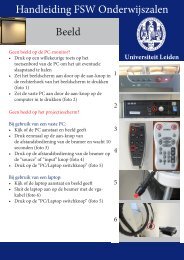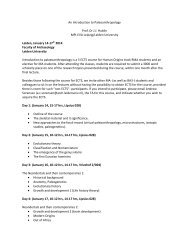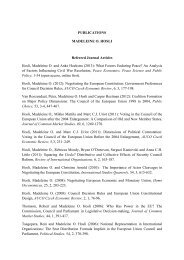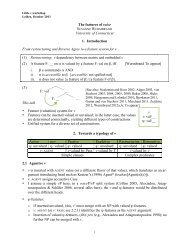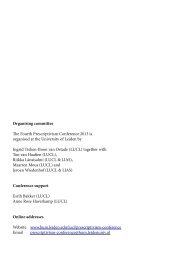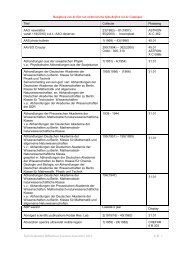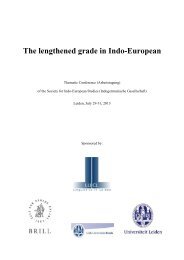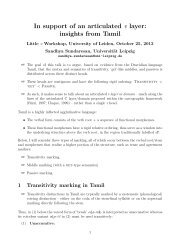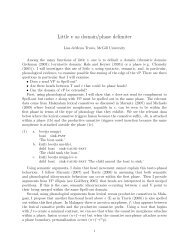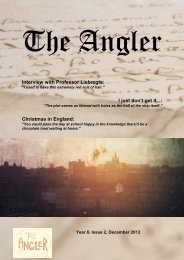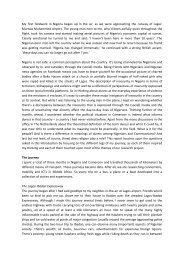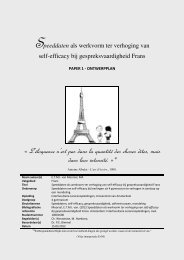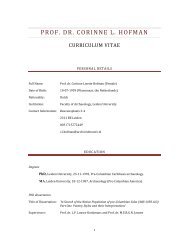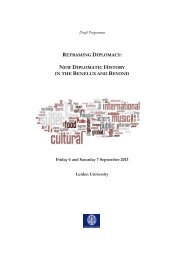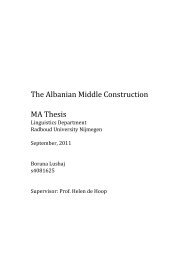LUC The hagUe ProfiLe 1
LUC The hagUe ProfiLe 1
LUC The hagUe ProfiLe 1
You also want an ePaper? Increase the reach of your titles
YUMPU automatically turns print PDFs into web optimized ePapers that Google loves.
For Wallace, and for us, the real point of this story (and of liberal arts and sciences)<br />
is to be critical about our awareness of ourselves and our certainties. He<br />
claims that most of the things he takes for granted or believes automatically in<br />
the world turn out to be wrong or untrue. And that there are many things in the<br />
world (like water for those two fish) that we simply don’t notice, no matter how<br />
essential they may be to our existence, either because we’re not thinking properly<br />
or because they conflict with something else we’re thinking about/interested in.<br />
So, a liberal arts education is not only about learning to think, but also, more<br />
deeply, about learning ‘how to exercise some control over how and what you<br />
think’ about. ‘It means being conscious and aware enough to choose what you<br />
pay attention to and to choose how you construct meaning from experience.’<br />
Freedom is about choice and awareness of choice … choice of how to BE in the<br />
world.<br />
So, liberal arts and sciences at <strong>LUC</strong> <strong>The</strong> Hague is about free-thinking, creative<br />
and critical students who aim to make a difference in the world, be it working in<br />
sexy, high-profile places like the UN, or NATO, or a government, corporation or<br />
university. But, it’s also about living in and contributing to the everyday world<br />
around us in the best way possible. In the words of David Foster Wallace:<br />
‘<strong>The</strong> really important kind of freedom involves attention and awareness and<br />
discipline, and being able to truly care about other people and to sacrifice for<br />
them over and over in myriad, petty, unsexy ways everyday.’<br />
College Organisation<br />
<strong>LUC</strong> <strong>The</strong> Hague is the international honours college of Leiden University, based<br />
in the Faculty of Campus Den Haag. It is a core part of the university’s honours<br />
college and excellence trajectory. <strong>LUC</strong> is organizationally connected with the<br />
rest of the university in a number of ways: the Dean of <strong>LUC</strong> sits on the Honours<br />
Council in Leiden; the Dean of <strong>LUC</strong> is advised by <strong>LUC</strong>’s Academic Advisory<br />
Board (which is composed of senior members of the other Faculties in Leiden);<br />
and the Dean of <strong>LUC</strong> sits on the Faculty Board of Campus Den Haag.<br />
<strong>The</strong> Dean is responsible for the academic leadership of <strong>LUC</strong> <strong>The</strong> Hague. He<br />
is assisted in servicing that responsibility by a team of academic and support<br />
staff, and, of course, by the students. As a college, all members of <strong>LUC</strong> share in<br />
responsibility for its success.<br />
In terms of academic management, the Dean chairs <strong>LUC</strong>’s Academic Board,<br />
which comprises the two Directors of Studies (BA and BSc) and a student representative.<br />
This body is responsible for the academic trajectory and strategy of<br />
<strong>LUC</strong> as a whole. <strong>The</strong> Academic Board meets every two weeks.<br />
At the level of general management, the Dean relies on the members of the<br />
Management Meeting, which includes the chairpersons of all committees and<br />
the holders of all institutional budgets. <strong>The</strong> Management Meeting occurs once<br />
every month.<br />
At the level of academic implementation, the management of the college relies<br />
on a series of committees. Matters pertaining to the content and coherence of<br />
<strong>LUC</strong>’s majors and minors are discussed in the Majors & Minors Council, under<br />
the responsibility of the Directors of Studies. For technical questions about the<br />
implementation of <strong>LUC</strong>’s Academic Rules & Regulations and the standardization<br />
of assessment practices, the Examinations Committee is responsible under<br />
the leadership of its chair; the ExCie is not a policy-making body but an implementation<br />
body. For matters related to academic student welfare and tutorial<br />
practice, the Tutorial Council is in charge, under the responsibility of the Senior<br />
Tutor. <strong>The</strong> Staff-Student Committee serves as a formal interface between the<br />
concerns of the faculty and students of <strong>LUC</strong> - it performs evaluations of classes<br />
and the programme as a whole, and its chair is responsible for issuing advice to<br />
the Dean.<br />
In terms of general management there are a cluster of administrative departments,<br />
including the Department of Public Relations & Marketing (headed by the Manager<br />
of PR&M), Department of Office Management (headed by the Officer Manager),<br />
and the Department of Student Affairs (headed by the Directors of Studies).<br />
<strong>The</strong>re are a number of other organs in <strong>LUC</strong>, such as the College Assembly,<br />
which brings together all members of the college at least once per semester<br />
for discussion and information sharing, and some of the committees have<br />
sub-committees. Information on all these bodies and their membership can be<br />
found on our website.<br />
14 <strong>LUC</strong> <strong>The</strong> <strong>hagUe</strong> <strong>ProfiLe</strong> <strong>LUC</strong> <strong>The</strong> <strong>hagUe</strong> <strong>ProfiLe</strong> 15



